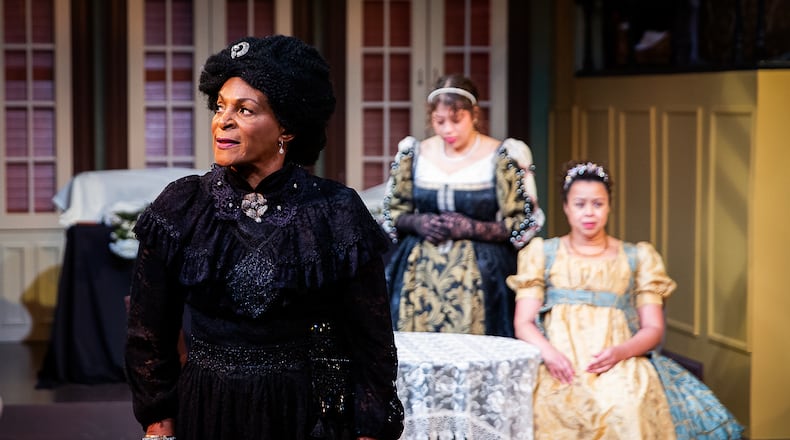This story was originally published by ArtsATL.
“The House That Will Not Stand” explores racism and misogyny through the eyes of Black women living in French colonial New Orleans. The Obie Award-winning play, onstage at Horizon Theatre through Aug. 6, gives you moments to laugh, cry and gasp as women struggle to navigate a fast-changing cultural landscape.
It’s not a fully polished piece but hits enough high notes to let the story soar.
“House,” written by Marcus Gardley and directed by Thomas W. Jones II, is the story of Beatrice Albans (Donna Biscoe), a free Black woman living in New Orleans in the wake of the Louisiana Purchase. It is the day before the United States officially takes control of the territory, which will result in a sharp decrease in rights, even for free Black people.
Beatrice hopes that the recent passing away of her white husband, Lazar, will secure her well-being once his will is read, but there is one problem: She is not actually his wife.
She is his placée, as known as a “left-hand bride.” This arrangement was common in French colonial New Orleans and was the most typical form of relationship between white men and Black women. Placées enjoyed the rights of free women. But with U.S. rule on the horizon, Beatrice’s status is in danger of being eclipsed by her late husband’s legal wife.
There’s another problem: Some think Beatrice killed Lazar.
We learn as much in the opening scene through a visit from Beatrice’s friend-turned-enemy, Madame LaVeuve (Latarsha Rose). LaVeuve needles Beatrice about the local gossip while feigning concern for Beatrice and Lazar’s daughters, Agnes (Margaret Ivey), Odette (Tequilla Whitfield) and Maude Lynn (Kenedi Deal), whose name is definitely a pun.
The young ladies have been forced by Beatrice to put their mourning on public display, despite their varying levels of indifference toward his death. Only Maude Lynn is genuinely bereaved, though her anguish is mostly due to Christian piety.
Credit: Shannel Resto
Credit: Shannel Resto
The cast has some standout performances, particularly from Biscoe as Beatrice and Alia Shakira as Makeda, who is the Albans family’s house slave trying to secure her freedom. Biscoe fully embodies Beatrice, and her sneering retorts are one of the most consistently enjoyable things in the show. It’s Shakira, however, who is the heart and soul of this play, delivering some of the most emotional moments and serving as the perfect counterbalance for the sharp-tongued Albans family.
While each of Beatrice’s three daughters finds levels of comedy and drama in her character, the juiciest moments go to Whitfield as Odette, who triumphantly claims the most laugh-out-loud sequence in the show. Let’s just say she is having an absolute ball in her role. Rose is also a versatile player, pulling double duty as Madame LaVeuve and Maria Josephine, Beatrice’s “crazy” sister who is kept locked in the attic.
Of course, this is New Orleans, so the play does dip its toe into the supernatural with allusions to voodoo and repeated implications that Lazar’s ghost may be haunting the house. This affords lighting designer Mary Parker plenty of opportunities to play around with eerie mood lighting and atmospheric flashes of thunder that evoke an oncoming storm, both a literal one and a metaphorical one.
Credit: Shannel Resto
Credit: Shannel Resto
The whole piece benefits from a sense of atmosphere, from L. Nyrobi Moss’ gorgeous costumes to Tyehimba Shabazz’s thrilling sound design. The dialect work is all over the place, with some actors attempting a Louisiana drawl while others thinking better of it. The few words of French in the script sound awkward coming out of the very Georgian actors. Still, some of the play’s most impactful moments come from embracing the fantastical or allowing time and space to blur, bringing the French influences of Creole culture into conversation with the characters’ African roots.
Gardley’s premise is dramatically rich, exploring how Black women struggle to assert themselves in a world where their freedom is only given at the behest of powerful men. While this production eventually finds that richness, it takes until halfway through the first act for all of the elements to settle.
The play honors the history of Black enslavement and the beauty and suffering from which Black culture emerges. The play is funny and fairly compelling and, in brief moments, touches something more magical. Go for those moments and take the rest of it as you will.
THEATER REVIEW
“The House That Will Not Stand”
Through Aug. 6. 8 p.m. Wednesdays-Saturdays, 3 p.m. Saturdays and 5 p.m. Sundays. $30-$35. Horizon Theatre, 1083 Austin Ave., Atlanta. 404-584-7450, horizontheatre.com.
::
Luke Evans is an Atlanta-based writer, critic and dramaturg. He covers theater for ArtsATL and Broadway World Atlanta and has worked with theaters such as the Alliance, Actor’s Express, Out Front Theatre and Woodstock Arts. He’s a graduate of Oglethorpe University, where he earned his bachelor’s degree, and the University of Houston, where he earned his master’s.
Credit: ArtsATL
Credit: ArtsATL
MEET OUR PARTNER
ArtsATL (www.artsatl.org), is a nonprofit organization that plays a critical role in educating and informing audiences about metro Atlanta’s arts and culture. Founded in 2009, ArtsATL’s goal is to help build a sustainable arts community contributing to the economic and cultural health of the city.
If you have any questions about this partnership or others, please contact Senior Manager of Partnerships Nicole Williams at nicole.williams@ajc.com.
About the Author
Keep Reading
The Latest
Featured




